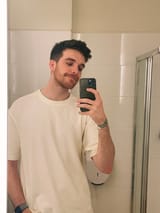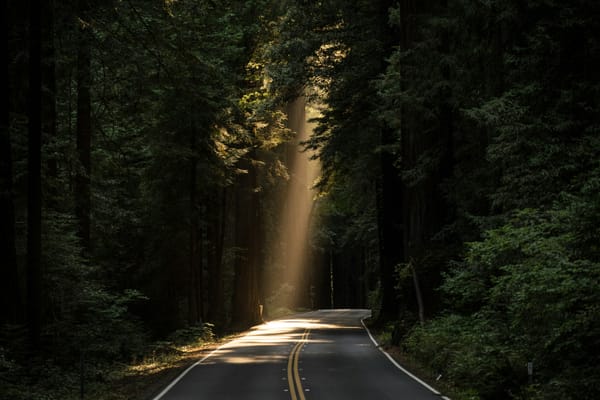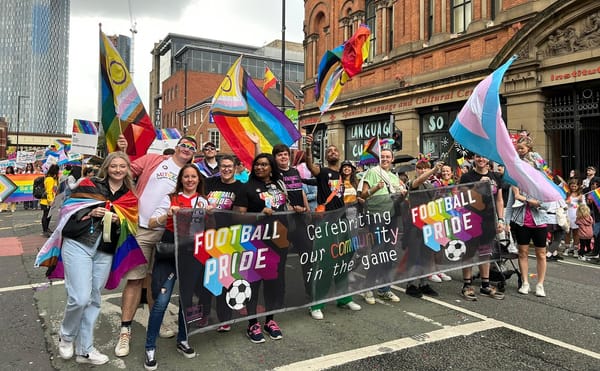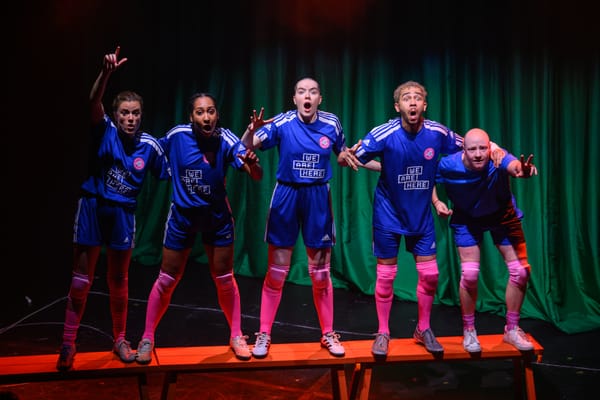How football gave me a queer social circle in a new city
Football is meant to give a sense of belonging. For Kevin, that was missing until he found a queer social circle thanks to football.
I never thought I’d publish a piece with the words “Ashley Barnes” and “twinks” in the same sentence, but that’s what you have to look forward to in this week’s article from Kevin.
It’s a moving exploration of how you can keep two parts of your identity entirely separate for years and the euphoria you get when you bring those two parts together at last.
Enjoy! And as always, if you do enjoy, please subscribe. It’s free and you get writing like this in your inbox ever week.
Adam
By Kevin Robinson
Football shouldn’t be lonely. By design, football absolutely should never be lonely.
And yet.
The very fact that football shouldn’t be lonely is exactly what can make it feel lonely. Intimidatingly lonely.
See, football generally comes with some sense of belonging. As a player, you’re part of a close-knit team. You work together, for each other, and fight the same battle. As a supporter, you form a community of passion, of pride, of loyalty. A shared experience rivalled by little.
To be a part of football is to feel a part of something. But what if you don’t? What if you’re supposed to feel included, but you’re not? That’s what can make football lonely.
I wanted to play football for a long time, but felt unable to. Because I’m gay. Even just the fear of my sexuality being an issue was enough to make me feel excluded from the game.
And the fear doesn’t come from nowhere. Mens football and the LGBTQ+ community have had a rocky relationship that is well-documented. As a supporter, I received homophobic abuse from my own club’s fan-base. It turned me away from football altogether for years. The way I feel about the club I support will probably never be the same again. I think I will always feel a certain emotional distance.
For forever, my gay identity was completely separate from my football identity. Two completely distinct parts of who I was, so opposed that they would fight each other. The ‘otherness’ of my sexuality meant I never felt entirely comfortable in football mode. I’d hide my sexuality, both actively and passively. But the obscurification was true in reverse too. Football felt so contrasting to my interpretation of the LGBTQ community that in order to fit in I’d throw that part out.
Two massive parts of my life that I had to awkwardly and performatively half-hide from each other, like divorced parents at Christmas.
That was, until I found a couple of football communities with one common denominator: they were queer.
After a difficult period in my life, I took the plunge and decided to move from rural Yorkshire to central Manchester. Eek. For somebody with a very limited social circle, that was daunting as fuck.
But it shouldn’t have been.
In one moment, everything I was missing just clicked.
I honestly can’t remember how I found Village Manchester FC, but I know what I said in my first enquiry email. “I’d probably just like to come along to training every few weeks,” I said.
It was supposed to be just low-key and casual. Two years later I’ve played for four of our five league teams, started every game as we won a national cup last year, been voted onto the committee as community officer and am now managing one of the teams. Pretty low-key. Pretty casual.
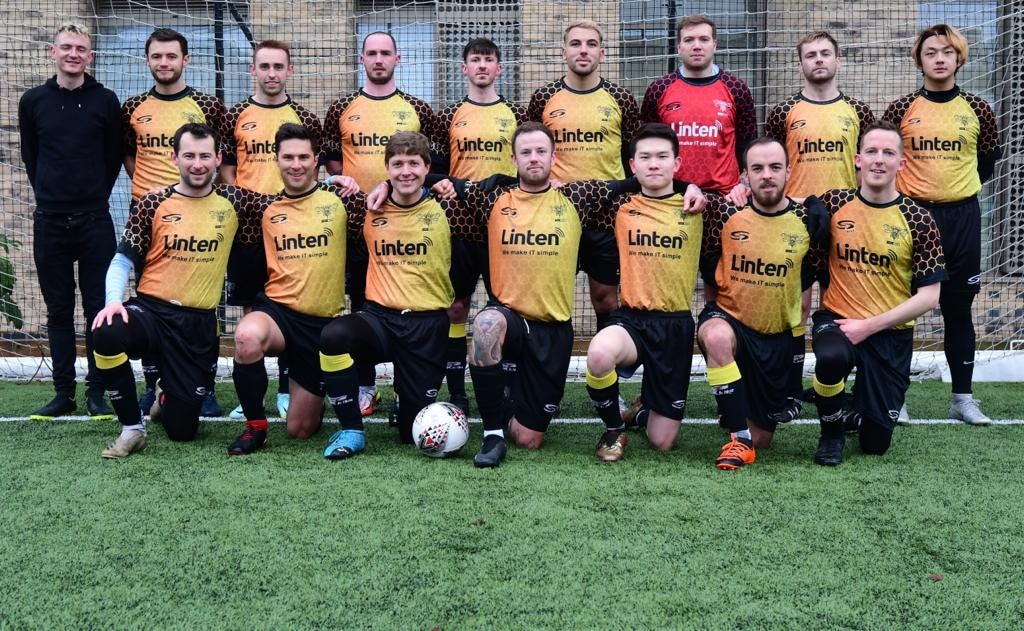
It happened because it has given my life so much: meaning, belonging, friendship.
After my first training session, I just felt euphoric. I didn’t live in Manchester, so I had to drive more than an hour home to Yorkshire and don’t think I stopped smiling the whole way. I was shy, unassuming, timid and properly scared.
I’d not kicked a ball in about 15 years, what on earth was I doing?
But just a couple of minutes in, someone jogged up to introduce themselves. They were camp as fuck. Like, almost stereotypical 2000s TV camp. We chatted briefly, before he ran off and thundered a shot into the top corner of the goal.
A short, unspectacular interaction, but one I remember so clearly, because it was the moment that sphere of illusion was shattered. Somebody being completely and unashamedly queer, while committing fully to their football. Just… wow.
I thought that queer representation in the media, in life, in the community was the visibility I needed. And it was to an extent. But this was more. This was me.
Between Village and the community of LGBTQ football fans I’d found on Twitter, I very quickly began to build up a social circle of people just like me.
We often talk about the importance of LGBTQ visibility. Of seeing people like yourself and how empowering that can be. I felt similar here. Because while seeing queerness is important, not every representation of queerness is necessarily something I can personally relate to. In fact, at its heart queerness is very much embracing the individual, breaking past arbitrary rules and homogenous personalities.
There are two levels of visibility. There’s the initial part we’re all familiar with: seeing LGBTQ people in the media, in business, in real life is a really important part of our personal development. This is about understanding that being 'different' isn't all that different. But then there’s a second part to visibility, where we start to see and understand the diversity of the community, and feel empowered to embrace both what unites us together and what makes us unique individually.
Beyond the validation it gave my identity, being part of this environment was also an amazing way to build up friends I could relate to in a very different way to anyone else I knew. And when I finally made the permanent move to Manchester, I had a friendship circle, and an extended community, ready and waiting for me. Which… wow, it made that transition a million times easier.
In the changing rooms chatting about boy drama.
Going to a football game together, talking about drag in the concourse.
Arguing over VAR while a drag artist lip-syncs to Celine Dion in a gay bar.
Singing Ashley Barnes’ name together over late-night pop hits hours later while clueless twinks look on bemused.
Watching big games in the pub and feeling safe.
Discussing topics such as footballers coming out, or Qatar’s World Cup, with people who are just as invested as me.
Now, just normal.
Making friends in the LGBTQ community can be much more difficult than you imagine it should be. For what can be a really close community, without the right opportunities it can also feel difficult to feel part of the right circle.
Subcommunities like the one I’ve found have a really important role to play. In other walks of life, your social groups are often built around common interests, and that’s exactly what I found here. There's no reason why you shouldn’t be able to find queer social circles based on your interests, just like anyone else does.
I felt truly a part of something for probably the first time in my life. Because football comes with some sense of belonging. I was part of a close-knit team. We worked together, for each other, and fought the same battle.
Thank you for reading Out and Out Football. Enjoy the piece? Please share it with a friend or two who you think might enjoy reading too.
